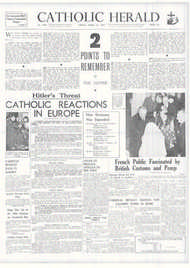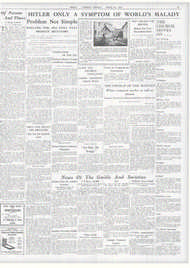Page 8, 24th March 1939
Page 8

Report an error
Noticed an error on this page?If you've noticed an error in this article please click here to report it.
Tags
Share
Related articles
We Are Democrats, Not Fascists
Christian Democrats From Classifieds Con"nued)
Mi The Editor Answer To Moloton Readers Of Mr. Molotov'ti
The Peril Menacing Mankind
Week By Week
DEMOCRACY IN DEADLY PERIL Dangers oi New Policy
No Justice Through Alliance With GPU
EMOCRACY, I wrote last week, is in deadly peril, in particular from those who cherish the illusion that political liberty is all that concerns democrats. Recent events in Central Europe and elsewhere furnish an unpleasantly direct reminder of these truths.
We have -first to record a direct, and, it is to be feared, a premeditated breach by Ilerr Hitler of the Munich Agreement.. We have next to record a growing movement of opinion in favour of an Anglo-Russian alliance in defence of freedom. Those who realise the true nature of Herr Hitler's offence must also realise the objection to the remedy so glibly proposed. MORAL, NOT POLITICAL CONDEMNATION
The German action in proclaiming a protectorate over Czecho-Slovakia is, of itself, no more an outrage than was our protectorate over Egypt. It is, and beyond question, to be condemned, not on political but on moral grounds, because it has been established in violation of a promise freely given, and because it is intended to facilitate not the preservation of peace and order (which are legitimate aims) but the violation of human rights in the ease of the Jews and the anti-German Czechs.
The Prime Minister was wise indeed to call special attention to the inauguration, as the first stage in this new technique of protection, of the vile system of police regulation and espionage which has spread to-day so far across Europe and Asia. But where has this the largest toll of victims? Where have its evil methods been elaborated to the highest pitch of infamy?
These questions are not hard to answer. And they are questions which have to be asked.
We challenge Herr Hitler's action in Bohemia on grounds not of politics but of morality. We ridicule the comparisons, so popular in Germany, between our military actions as an imperial Power an& those of Germany on the specific and just ground that, however forceful our action, it has been aimed always at the preservation and extension and never at the suppression of the sacred human rights and liberties which are the foundation of civilisation. We must be very careful not to whittle away our strong and clear case against Germany to a puerile absurdity.
It does not matter one iota in the scale of human values whether Bohemia is a technically independent State economically and politically dependent upon a powerful neighbour (be that neighbour Germany or France) or whether she be a formal protectorate.
In each case there will be dissatisfied minorities, and in each case the. destinies of her people are liable to be subjected to the stress and strain of any war in whieh their protector or ally is involved. History and geography alike have made this inevitable through a thousand years of history.
What matters is the specific wrongs which Germany is inflicting upon the Bohemians and Moravians by persecution and robbery, and the specific wrong that Germany has inflicted on Great Britain by breaking the Munich Agreement.
We are likely, unless we are careful, to forfeit not only our right but our power to remedy these wrongs by entering into engagements with the one power whose record, alike in regard to persecution, robbery and to international engagements, is a thousand times worse than that of Germany herself. THE ONE THING THAT CAN UNITE GERMANY
The moral damage to the world's conscience which will ensue from an engagement with Moscow is incalculable, and its political consequences will be disastrous.
The peoples of Germany and Italy are deeply divided over the recent events. They trusted their leaders to work for peace. They desire no continental conquests. The anti-Jewish excesses have aroused a deep feeling of uneasiness in many quarters, not excluding some of the highest in the German government itself. Precisely as in 1914 there is in Germany a strong will to peace and a still vital Christian tradition.
The one thing that can unite Germany in favour of the ruthless and cynica/ policy advocated by Herr Goebbels and his school will be the return to the policy of encirclement, with Russia as the Eastern bastion of the anti-Fascist forces.
Nor must we forget that the fear and detestation of Russia, of the vile and ' bloody doctrines for which she stands sponsor before the world, is almost as strong in Hungary and Italy as in Germany, is quite as strong in Spain, and is a very powerful factor indeed in the policies of Poland, Rumania and Bulgaria.
These considerations run deep. You cannot cure evil by evil. However tempting a hasty coalition of Eastern States against Germany may seem as a diplomatic reply to Herr Hitler's coup, such a coalition can never last if it is based on Russia. England is a Christian democracy. Russia is an atheist tyranny. So, too, is Turkey.
If war comes it will be long and anxious: the victory trill go to the Powers which have a clean conscience and a clean cause, pawns in the improvised game of Realpolitik organised by the Dictator at the Kremlin and his henchmen of the Popular Front.
GESTAPO OR CPU?
It is perfectly obvious that if peace is to be preserved, it must he on the basis of preserving for the time being the frontiers and independence of the whole of the states of Eastern Europe.
The march of the German army must be halted. That is not because any particular moral validity attaches to the existing frontiers but because, whatever the. grievances may be, Herr Hitler's remedies are a thousand times worse. To be blunt, Central Europe is relapsing into barbarism. The conditions of the Thirty Years' War are returning. Germany would be well advised to reflect that the slaughter and shame of these wars had such a lasting effect that her rise to the status of a great power was delayed, as a direct consequence, for more than two centuries.
But we also should reflect. To-day, when wars can no longer be localised, the consequences of the anarchic banditry with which Europe is threatened will last not for two centuries but for ten, and who can say whether the. immediate consequences will be worse if the first victory goes to the Gestapo or Lhe GMT? To work lightheartedly for the maximum extension of the area of conflict, regardless of the declared aims and policies of our prospective allies, would be not statesmanship but crime. We have no right to take a gamble, the consequences of which cannot be foreseen.
We must preserve, in this emergency, not only our moral but our political sanity. I hear much talk of the battle for democracy.
The crisis in Eastern Europe has nothing whatever to do with democracy. Poland, Russia, Rumania, Greece and Turkey are all under dictatorships, some of them not even operating under the bare forms of law. If war comes, our allies in the main theatre of war will 5e these dictators, none of whom shares or even professes to share, our ideals in religion or politics.
At the first hint of war France has been compelled to suspend her constitution, and we shil do the same. War, if it comes, will mean the end of parliamentary government in Western Europe, and will as certainly not mean its revival in the East. It is the torture chamber, not the polling booth, that accompanies the armies of Moscow. Already in our own country urgent social reforms have become impossible, and the rise of the standard of living of the poor has been deferred for at least a generation by the progress of rearmament.
We must be prepared to fight, not because by fighting we can save democracy (that is balderdash), but because, if we are not prepared to fight, the whole structure of civilisation will collapse into anarchy. In other words, if we show ourselves weak or craven, a world war is inevitable. blee I w declare our readiness to fight and to preserve, with our freedom of action, our ability to act with decisive energy and overwhelming force, a world war ceases to be inevitable, because we may be able to impose Peace.
LEADERSHIP OF THE POPE The greatest danger of the present situation is that in our righteous indignation we may be led into policies that will strengthen instead of weakening the German will to war, and may even, in the last resort, make a declaration of war by Germany inevitable. An encircling alliance, dominated in a military sense by Russia, will certainly strengthen immeasurably the military party in Germany. A policy of economic blockade will confront the German government and people alike with the alternatives of " death or glory " and " death with ignominy." In that case who, knowing the Germans to be a brave people, could doubt their choice? Finally, a reversion to the post-Munich policy of a silent, sullen piling-up of armaments, broken only by periodic outbursts of abuse (sometimes parliamentary, but sometimes not) will lead inevitably to another crisis. The pot is near the boil. Unless the fire is damped down, it will boil over. It is no good saying, self-righteously, that Herr Hitler lit the fire. That is true, but irrelevant. We also shall be scalded to death if the catastrophe happens.
The Archbishop of Canterbury spoke wise and generous words, which should be kept on record particularly by Catholics, when he urged the need for united Christian action under the leadership of the Pope.
A lecture on the virtues of tolerance read by H. Stalin is one remedy for our present ills. An appeal to all Christians, German as well as English, Italian as well as French, by the Vicar of Christ is another. The first can only lead to tear. The second may, uvele.r the inspiration of the Holy Ghost, lead to peace.
And if we, who leek this inspiration, cannot see precisely how best this end is to be achieved, we can at least understand that to secure peace we must first of all desire it, and having desired it with our whole minds and hearts, we must be prepared to pursue it. We must not only say to Germany in unmistakable terms " thus far and no further," but we must with equal clarity define the steps which we propose to follow, of our own initiative, to secure a lasting settlement. The first step, inevitably, is the complete demobilisation of all countries to their authorised peacetime establishments. The second is the reopening of negotiation for a free interchangeof essential commodities. What is worse than useless, in the light of past history, is to ask Germany for a sign of her pacific intentions without any hint whatever of what, in the event of the sign being forthcoming, we are proposing to. do. Germany may yet go to Canossa, but she is certainly not going again to Versailles.
blog comments powered by Disqus

















